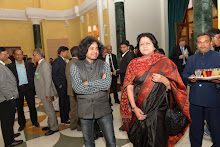Today we require a safe and healthy environment to fulfil fundamental human rights. Articulating the fundamental rights of peoples in relation to climate change establishes the freedom to secure rights through human rights bodies like NHRC, NHRI, ILO, International Court, and OHCHR in national/international debate, just as an autonomous body or public tribunals do. We know that the Universal Declaration of Human Rights-UDHR is a milestone document in the history of human rights and humanity. Drafted by representatives with different legal and cultural backgrounds from all regions of the world, the Declaration was proclaimed by the United Nations General Assembly in Paris on December 10th, 1948 through the General Assembly resolution 217-A’ as a common standard of achievements for ‘All Peoples’ and ‘All Nations’. At this ‘75@Amritkaal’ moment now we should think, that the 75th anniversary is an opportunity to rejuvenate the Universal Declaration of Human Rights, demonstrate how it can meet the needs of our time, and advance its promise of freedom, fraternity, brotherhood, universal approach and values, equality and justice for all. India is a rapidly developing country with a population of over 1.4 billion people. This has resulted in increased pressure on natural resources and a rise in environmental degradation. As a result, the need for environmental rights in India has become more pressing than ever before. Here are some reasons why those issues are: Protection of the environment, Conservation of natural resources, Climate change, Health and well-being, and Sustainable development. But, the most important thing is well-being, livelihood with dignity in a clean nature. Without this, we cannot achieve any goals of SDG 2030. The Indian Constitution and environmental laws recognize the importance of protecting the environment and promote sustainable development. But, no doubt, we are facing challenges like environmental issues, socioeconomic and cultural, nature threats, and liveliness. Human rights may be safeguarded when our current situation is protected, and when climate change occurs, human rights may also suffer due to the proximity of both. Indian knowledge tradition and our heritage of civilization are our backbones. We believe in ‘Sarve Bhavantu Sukhinah, Sarve Santu Niramaya’. We believe in ‘īśāvāsyamidaṃ sarvaṃ yatkiñchya jagatyāṃ jagat, tena tyaktena bhuñjīthā mā gṛdhaḥ kasya sviddhanam’. Indian Sanatan tradition is the sole of humanism. But today, we have a lot of questions about nature, culture, climate change, and human rights. We have questions about our generation's and future generations' sustainability, scopes, possibilities, and alternatives. We cannot survive without a better nature, a clean environment, sustainable peace, and human dignity.
सदस्यता लें
संदेश (Atom)
